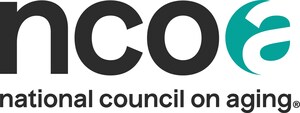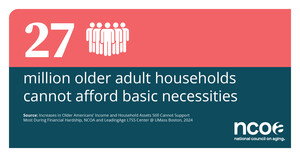Events planned in state capitals, local senior centers, and online to publicize the dangers of falls and preventive measures that can be taken
WASHINGTON, Sept. 22 /PRNewswire-USNewswire/ -- Yesterday, the U.S. Senate unanimously passed resolution S. Res. 633, designating September 23, 2010 as "National Falls Prevention Awareness Day" to raise awareness and encourage the prevention of falls among older adults. The declaration can be viewed at www.govtrack.us/congress/bill.xpd?bill=sr111-633.
(Logo: http://photos.prnewswire.com/prnh/20100615/NCOALOGO)
(Logo: http://www.newscom.com/cgi-bin/prnh/20100615/NCOALOGO)
The Falls Free™ Coalition and the National Council on Aging (NCOA) would like to thank sponsor Sen. Herb Kohl (D-WI) and co-sponsors Sen. Robert Casey (D-PA), Sen. Russell Feingold (D-WI), Sen. George LeMieux (R-FL), and Sen. Barbara Mikulski (D-MD) for their support in sponsoring the passage of the resolution.
"Directing resources to prevention programs, including the prevention of falls, is an investment that pays off in the long-run by saving billions of dollars that would otherwise be spent on treatment," said Sen. Kohl, chairman of the Senate Special Committee on Aging. "Prevention programs are important because they help to alleviate the rise in health care expenditures, and I am proud to have supported the Administration on Aging's falls prevention programs."
Across the country, state governments, senior centers, and older adults will observe Falls Prevention Awareness Day on the first day of fall, September 23, 2010. Thirty-five states will participate, joining more than 70 national organizations, professional associations, and federal agencies that comprise the Falls Free™ Coalition to raise awareness of the dangers of fall-related injury and death among older adults.
Falls are the leading cause of fatal injuries for Americans aged 65 years and older. More than 18,000 older Americans die every year because of a fall, and the rate has risen dramatically over the last 10 years. The U.S. spends an estimated $19 billion annually on medical care related to falls; in 2008, over 2.1 million older adults were treated in emergency departments for fall-related injuries.
"When an older adult falls, it can begin a cascade of events affecting quality of life, including a loss of independence, reduced mobility, and even earlier admission to a nursing home," said Lynn Beattie, vice president of Injury Prevention with NCOA, which leads of the National Falls Free™ Initiative. "An injurious fall can also affect caregivers, family members, and even entire communities. But the good news is that falls are largely preventable."
Studies show that a combination of interventions can significantly reduce falls in the older adult population. Experts recommend a physical activity regimen with balance, strength training, and flexibility components; in the case of a history of falls or balance and gait difficulties, consulting with a health professional about getting a fall risk assessment; having medications reviewed periodically; getting eyes checked annually; and making sure the home environment is safe and supportive.
Senior centers and other community-based organizations serving older adults across the U.S. are offering programs like A Matter of Balance and Stepping On, along with Tai Chi: Moving for Better Balance classes, to help older adults gain the strength, improved balance, and confidence to help them live healthier lives and preserve their independence.
For additional information, please visit www.ncoa.org/improving-health/falls-prevention/ and http://www.healthyagingprograms.org/content.asp?sectionid=149.
About The Falls Free™ Coalition
Led by the National Council on Aging, the Falls Free™ Coalition, includes 31 states and 70 national organizations, professional associations, and federal agencies who are working collaboratively to bring education, awareness, and evidence-based solutions to local communities. Falls Free™ seeks to provide hundreds of thousands of older Americans with the resources and education needed to reduce their risk of injury.
About NCOA
The National Council on Aging is a nonprofit service and advocacy organization headquartered in Washington, DC. NCOA is a national voice for older Americans - especially those who are vulnerable and disadvantaged - and the community organizations that serve them. It brings together nonprofit organizations, businesses, and government to develop creative solutions that improve the lives of all older adults. NCOA works with thousands of organizations across the country to help seniors find jobs and benefits, improve their health, live independently, and remain active in their communities. For more information, visit www.NCOA.org.
SOURCE National Council on Aging
WANT YOUR COMPANY'S NEWS FEATURED ON PRNEWSWIRE.COM?
Newsrooms &
Influencers
Digital Media
Outlets
Journalists
Opted In






Share this article